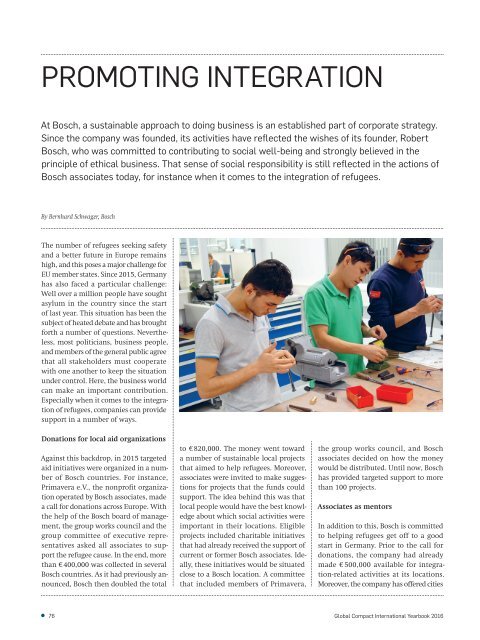Global Compact International Yearbook 2016
The Sustainable Development Goals are an ambitious agenda with 17 topics addressing the global challenges of our time. A key topic is innovation: Business must fit into planetary boundaries. This probably will not work with traditional business models. That is why we need new, fresh ideas. We need change, even when it happens in a rough, disruptive way. And the earlier the better. This is why the upcoming edition of the Global Compact International Yearbook, published in September 2016, has chosen sustainable innovation as the key topic. Also includes exclusive interviews with Angelina Jolie, Robert Redford and Sigourney Weaver. The Global Compact International Yearbook is with more than 500,000 readers one of the worlds leading CSR publications. Münster/New York 2016: 164 pages, paperback Publishing houses: macondo publishing/UN Publications Subscription (via UN Publications only): 30.00 USD (regular) 15.00 USD (reduced) ISBN13: 978-3-946284-01-7 / ISSN-Print: 2365-3396 / ISSN-Internet: 2365-340x
The Sustainable Development Goals are an ambitious agenda with 17 topics addressing the global challenges of our time. A key topic is innovation: Business must fit into planetary boundaries. This probably will not work with traditional business models. That is why we need new, fresh ideas. We need change, even when it happens in a rough, disruptive way. And the earlier the better. This is why the upcoming edition of the Global Compact International Yearbook, published in September 2016, has chosen sustainable innovation as the key topic.
Also includes exclusive interviews with Angelina Jolie, Robert Redford and Sigourney Weaver.
The Global Compact International Yearbook is with more than 500,000 readers one of the worlds leading CSR publications.
Münster/New York 2016: 164 pages, paperback
Publishing houses: macondo publishing/UN Publications
Subscription (via UN Publications only): 30.00 USD (regular) 15.00 USD (reduced)
ISBN13: 978-3-946284-01-7 / ISSN-Print: 2365-3396 / ISSN-Internet: 2365-340x
You also want an ePaper? Increase the reach of your titles
YUMPU automatically turns print PDFs into web optimized ePapers that Google loves.
Promoting integration<br />
At Bosch, a sustainable approach to doing business is an established part of corporate strategy.<br />
Since the company was founded, its activities have reflected the wishes of its founder, Robert<br />
Bosch, who was committed to contributing to social well-being and strongly believed in the<br />
principle of ethical business. That sense of social responsibility is still reflected in the actions of<br />
Bosch associates today, for instance when it comes to the integration of refugees.<br />
By Bernhard Schwager, Bosch<br />
The number of refugees seeking safety<br />
and a better future in Europe remains<br />
high, and this poses a major challenge for<br />
EU member states. Since 2015, Germany<br />
has also faced a particular challenge:<br />
Well over a million people have sought<br />
asylum in the country since the start<br />
of last year. This situation has been the<br />
subject of heated debate and has brought<br />
forth a number of questions. Nevertheless,<br />
most politicians, business people,<br />
and members of the general public agree<br />
that all stakeholders must cooperate<br />
with one another to keep the situation<br />
under control. Here, the business world<br />
can make an important contribution.<br />
Especially when it comes to the integration<br />
of refugees, companies can provide<br />
support in a number of ways.<br />
Donations for local aid organizations<br />
Against this backdrop, in 2015 targeted<br />
aid initiatives were organized in a number<br />
of Bosch countries. For instance,<br />
Primavera e.V., the nonprofit organization<br />
operated by Bosch associates, made<br />
a call for donations across Europe. With<br />
the help of the Bosch board of management,<br />
the group works council and the<br />
group committee of executive representatives<br />
asked all associates to support<br />
the refugee cause. In the end, more<br />
than € 400,000 was collected in several<br />
Bosch countries. As it had previously announced,<br />
Bosch then doubled the total<br />
to € 820,000. The money went toward<br />
a number of sustainable local projects<br />
that aimed to help refugees. Moreover,<br />
associates were invited to make suggestions<br />
for projects that the funds could<br />
support. The idea behind this was that<br />
local people would have the best knowledge<br />
about which social activities were<br />
important in their locations. Eligible<br />
projects included charitable initiatives<br />
that had already received the support of<br />
current or former Bosch associates. Ideally,<br />
these initiatives would be situated<br />
close to a Bosch location. A committee<br />
that included members of Primavera,<br />
the group works council, and Bosch<br />
associates decided on how the money<br />
would be distributed. Until now, Bosch<br />
has provided targeted support to more<br />
than 100 projects.<br />
Associates as mentors<br />
In addition to this, Bosch is committed<br />
to helping refugees get off to a good<br />
start in Germany. Prior to the call for<br />
donations, the company had already<br />
made € 500,000 available for integration-related<br />
activities at its locations.<br />
Moreover, the company has offered cities<br />
76<br />
<strong>Global</strong> <strong>Compact</strong> <strong>International</strong> <strong>Yearbook</strong> <strong>2016</strong>

















